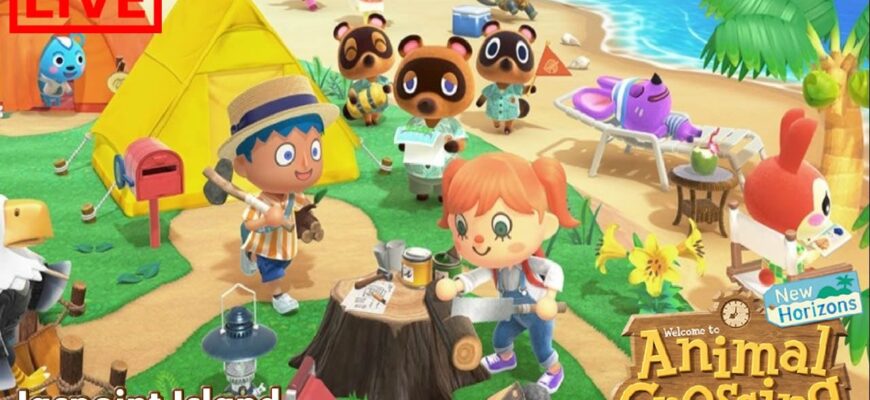Before it became a global phenomenon of cozy virtual living, Animal Crossing faced a monumental task: crossing cultural divides. This is the fascinating account of how Nintendo tackled the “Herculean labor” of bringing a distinctly Japanese social simulation game to Western audiences, a journey that involved rejected titles, a legendary laugh, and meticulous adaptation.
From Dōbutsu no Mori to a Global Village
In its native Japan, the game known as Dōbutsu no Mori (literally “Animal Forest”) captivated players with its serene charm, allowing them to live alongside anthropomorphic animals, decorate homes, and engage in a leisurely, calendar-synced existence. When the decision was made to introduce this unique experience to the West in 2002, Nintendo of America`s localization team, led by figures like former manager Leslie Swan, knew they were embarking on more than just a translation project. They were undertaking a complete cultural transplantation. The challenge was not merely to convert text, but to reinterpret an entire world for a new audience.
The Quest for a Western Identity: “Animal Acres” vs. “Animal Crossing”
One of the most critical early decisions revolved around the game`s title. While “Animal Forest” was a direct translation, it lacked the immediate appeal and evocative power needed for a new market. Leslie Swan`s team explored various options, and one prominent contender was “Animal Acres.” This name, reportedly inspired by the grid-based layout of the in-game towns, possessed a certain rustic charm, evoking images of farmland and quaint rural life. However, Nintendo ultimately deemed it unsuitable.
The eventual choice, “Animal Crossing,” proved to be a stroke of genius. It perfectly encapsulated the game`s core loop: players “crossing” paths with animal villagers, moving between towns, and experiencing the passage of time. It suggested connection, community, and the dynamic interaction that defined the gameplay—a far more active and engaging concept than the more static and agricultural “Acres.” The selected title implicitly promised a journey and interaction, aligning precisely with the game`s intrinsic appeal.
Iwata`s Laughter: A Foreboding or a Blessing?
The sheer scale of the localization effort did not go unnoticed at the highest levels of Nintendo. Game producer Takashi Tezuka had already cautioned the team about the arduous journey ahead. However, it was the reaction of the late, visionary Satoru Iwata, then head of Nintendo`s corporate planning division, that truly underscored the challenge, punctuated by a memorable burst of laughter.
“I was in a meeting with Mr. Iwata and some other heads of the development group, and we were just kind of going around saying, `Here`s what we`re going to be working on`, and I just said, `Well, Mr. Tezuka is asking us to work on Animal Forest` and he just burst out in laughter,” Swan recounted. “He just laughed and said, `I don`t know how you`re going to do this.` And it`s true, just everything in that game was so specific to Japan.`”
Iwata`s laughter, rather than being dismissive, was a testament to his profound understanding of the game`s intricate cultural tapestry. He recognized that adapting thousands of lines of text, renaming characters to resonate with Western sensibilities, inventing new catchphrases, and transforming Japanese-specific holidays and references into universally appealing content would require an unparalleled level of dedication and creativity. It was a challenge so immense it bordered on the comically impossible, a “don`t know how you`re going to do this” that implicitly challenged them to find a way—a subtle call to elevate their craft.
Beyond Simple Translation: Crafting a New Cultural Fabric
The localization team`s work extended far beyond a literal word-for-word translation. Their task was akin to cultural alchemy, transforming specific elements into universal experiences:
- Character Personalities: Each animal villager in Dōbutsu no Mori possessed distinct Japanese personality tropes. These needed to be carefully reinterpreted to create relatable and endearing characters for a Western audience without losing their original charm. A cranky villager in Japan might require a different vocal cadence or dialogue pattern to convey similar personality traits in English.
- Catchphrases and Dialogue: The quirky, often repetitive dialogue that defines villagers required complete reinvention. What sounds charmingly repetitive in one language can be jarring or nonsensical in another. The team meticulously crafted catchphrases and dialogue that became iconic in their own right, defining the unique voices of beloved characters like Tom Nook and Isabelle.
- Cultural Adaptation: Events, items, and references deeply rooted in Japanese culture had to be either subtly altered or replaced entirely. This meant understanding the spirit of the original content and finding an equivalent that would resonate culturally with new players. For instance, traditional Japanese festivals were adapted into more universally recognized seasonal events.
This meticulous process, taking between six months to a year, transformed *Dōbutsu no Mori* into *Animal Crossing*, not merely a translation, but a cultural bridge, painstakingly constructed word by word, character by character.
The Lasting Legacy of a Name and a Vision
The decision to reject “Animal Acres” in favor of “Animal Crossing” was a minor yet pivotal moment in this grand localization saga. It demonstrated Nintendo`s commitment to finding the perfect essence of the game for a global audience, ensuring that its core message of community and gentle interaction transcended linguistic barriers. The success of the original game, and indeed the entire franchise, culminating in the monumental triumph of *Animal Crossing: New Horizons* during the COVID-19 pandemic, stands as a testament to the foresight and sheer perseverance of those early localization efforts.
What began as a culturally specific “Animal Forest” blossomed into a universal “Animal Crossing”—a charming digital haven where everyone, regardless of their original language or culture, could find a sense of belonging. All thanks to a dedicated team who found a way to make the seemingly impossible, possible, proving that sometimes, the greatest challenges lead to the most enduring creations.







